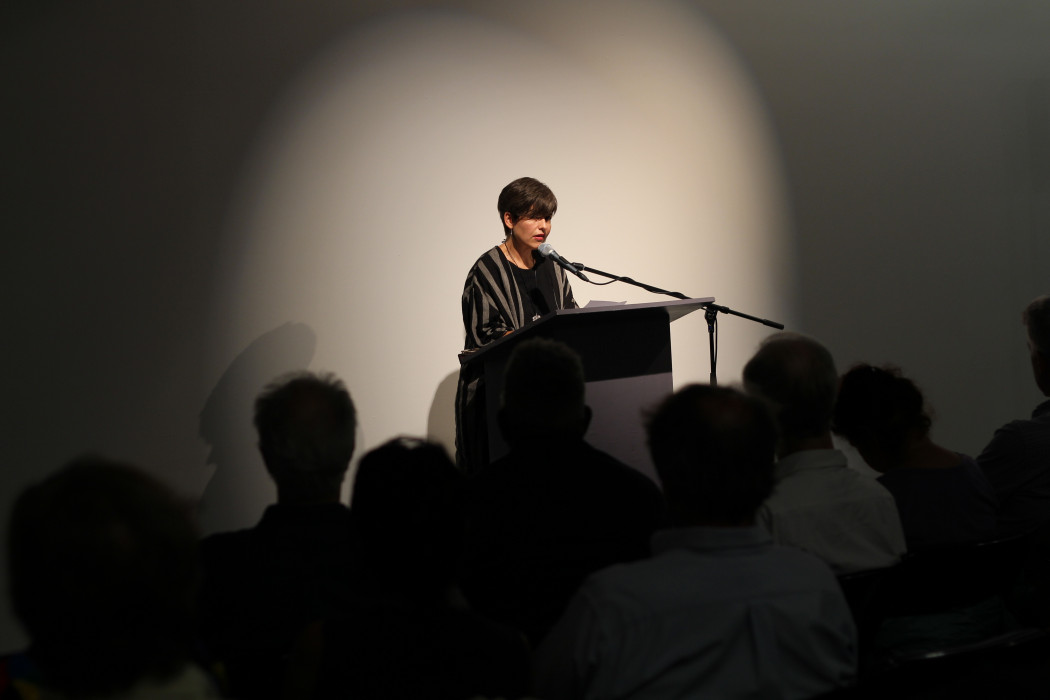Readings in Contemporary Poetry
Raphael Rubinstein and Mónica de la Torre
Tuesday, October 14, 2014, 6:30 pm, Dia Chelsea
Tuesday, October 14, 2014, 6:30 pm
535 West 22nd Street, 5th Floor
New York City
Introduction by Vincent Katz
Raphael Rubinstein
Raphael Rubinstein is a New York-based poet and art critic. Among his books of poetry are The Afterglow of Minor Pop Masterpieces (2007) and The Basement of the Café Rilke (1997). His poems have recently appeared in Fence, Vanitas and Privacy Policy: the Anthology of Surveillance Poetics (2014).
Our Lady of Pompeii/John Lee Hooker
“I acted alone,” read the caption
on the front page of a tabloid
I hadn’t yet seen as morning came
and I headed uptown toward Bleecker Street.
It was time to think about
New York City because it was all around me;
it was time to think about
those who couldn’t adequately enjoy the day
I was walking into as into a poem by Philippe Jaccottet
because of the insidious meshing
of their parents’ socio-economic status
and a system that reserves its greatest rewards
for the owners of secret algorithms.
Greenwich, Spring, Hudson, Vandam, Varick, Carmine.
If every passerby is a potential poem
or a friend like, say, Holly or Bruce,
or even both, then nested in every building
is the outline of a mineral explanation of
why things are the way they are:
the Doric columns flanking the school door
across from the café where I’m sitting now
with an espresso made by Joe (Gió?)
and this open notebook where I, too, act alone,
not only support a name-bearing pediment
but are the concrete consequence of precisely
those supple nets of obligations and expectations
that interfere with the realization of enshrined rights
scratched onto a sheet of dried animal skin
that, in any case, extended no sheltering cloak
to fractional citizens whose thumping commentary
vibrated along the floorboards and through
the jittery windows of tar-paper palaces.
on the front page of a tabloid
I hadn’t yet seen as morning came
and I headed uptown toward Bleecker Street.
It was time to think about
New York City because it was all around me;
it was time to think about
those who couldn’t adequately enjoy the day
I was walking into as into a poem by Philippe Jaccottet
because of the insidious meshing
of their parents’ socio-economic status
and a system that reserves its greatest rewards
for the owners of secret algorithms.
Greenwich, Spring, Hudson, Vandam, Varick, Carmine.
If every passerby is a potential poem
or a friend like, say, Holly or Bruce,
or even both, then nested in every building
is the outline of a mineral explanation of
why things are the way they are:
the Doric columns flanking the school door
across from the café where I’m sitting now
with an espresso made by Joe (Gió?)
and this open notebook where I, too, act alone,
not only support a name-bearing pediment
but are the concrete consequence of precisely
those supple nets of obligations and expectations
that interfere with the realization of enshrined rights
scratched onto a sheet of dried animal skin
that, in any case, extended no sheltering cloak
to fractional citizens whose thumping commentary
vibrated along the floorboards and through
the jittery windows of tar-paper palaces.
Mónica de la Torre
Mónica de la Torre is the author of Public Domain (2008) and Talk Shows (2007), as well as two collections in Spanish: The Happy End (2014) and Four (2012). Her work has been published in Aufgabe, Art in America, Convolution, frieze, and Triple Canopy’s Corrected Slogans. She is senior editor at BOMB Magazine.
Mind-Set
As if language made the image legible,
and credible, not edible, though consumption
is… We know—
we’ve consumed enough consumption
and have grown tired
of the hostile environment
of the environment.
People read the paper in the morning—
at night they turn to fictions.
What kinds of dreams
would reversing this simple habit
precipitate.
Speak the language
of what had heretofore
been unsaid.
And spare us the illustration.
We’ve seen it before.
And speaking of commitment—
Memory is an asylum, a dream we try to decipher
while still asleep.
The joke she botches
every time she tries to get it right.
and credible, not edible, though consumption
is… We know—
we’ve consumed enough consumption
and have grown tired
of the hostile environment
of the environment.
People read the paper in the morning—
at night they turn to fictions.
What kinds of dreams
would reversing this simple habit
precipitate.
Speak the language
of what had heretofore
been unsaid.
And spare us the illustration.
We’ve seen it before.
And speaking of commitment—
Memory is an asylum, a dream we try to decipher
while still asleep.
The joke she botches
every time she tries to get it right.
Explore
Mónica de la Torre Audio from Readings in Contemporary Poetry
Move to Mónica de la Torre Audio from Readings in Contemporary Poetry pageRaphael Rubinstein Audio from Readings in Contemporary Poetry
Move to Raphael Rubinstein Audio from Readings in Contemporary Poetry page
